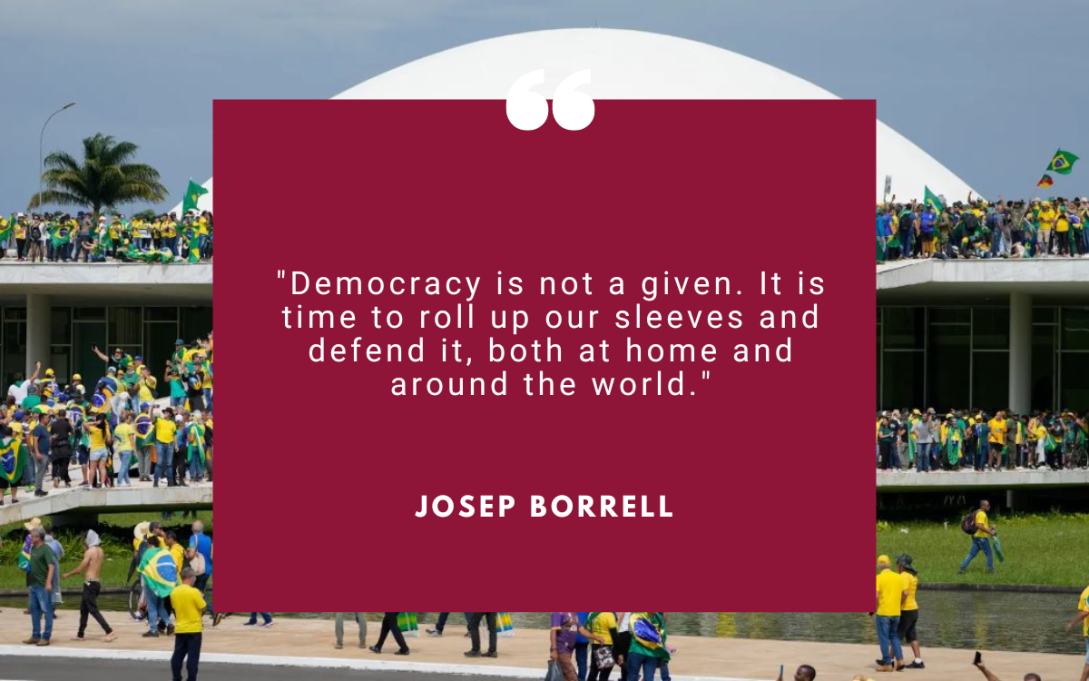After the new attack on democracy in Brasilia, what should we do?

Sunday 8 January will go down in Brazil's history as one of its darkest days. My first phone call with the new Brazilian Foreign Minister, Mauro Vieira, was not only to congratulate him, but above all to reiterate the European Union's full support and solidarity to President Lula and his government in the face of this vandalism. The images of the rampage were also particularly appalling for me, because I had the opportunity to visit in 2021 the Planalto Palace, the seat of the Brazilian Presidency, and admire its architecture and the artworks, which have now been destroyed.
The attack on Brazil’s core institutions did not start last Sunday
However, the attack on Brazil’s core institutions did not start last Sunday. They are the outcome of years of political polarisation. During the term of former President Jair Bolsonaro the foundation of a pluralist society and democratic institutions were continuously attacked. Political parties were demonized, the judiciary was harassed, the press vilified, and civil society set aside in the main debates. Social media have put such trends on steroids, aggravating the division in Brazilian society. We know that such information bubbles feed "culture wars" and identity politics.
President Lula announced that he wanted to “heal the wounds of society”. This is now more necessary but probably also more difficult.
Just after his election, President Lula announced that he wanted to “heal the wounds of society” and unite the country again. This is now more necessary but probably also more difficult. As we have seen, there are political forces ready to feed radicalization and chaos in a blatant effort to force the intervention of the armed forces. However, fortunately they seem to have learnt the lessons of previous coup attempts.
A strong message about the solidity of Brazilian democratic institutions
The meeting with the heads of the executive, legislature and judiciary powers and the governors of Brazilian federal states on Monday 9 January delivered a strong message about the solidity of Brazilian democratic institutions. However, uniting around democracy requires more than simply condemning violence and extremism. All political forces carry the responsibility to engage proactively to prevent radicalization and defend democratic processes on a daily basis, also by creating the conditions for dialogue and compromise.
Order seems to have returned to Brasilia. However, there are many questions about the causes and responsibilities of these events. What has happened in Brasilia looks very much like the assault on the Capitol in Washington in January 2021. The fact that two big democracies of the Americas have experienced a physical attack against the main institutions embodying their constitutional order should make us pause and reflect. In Latin America as a whole, support for democracy has fallen from 63% in 2010 to 49% in 2020 according to the Latinobarometro.
Why have the American and Brazilian societies have become so polarized?
Why have societies become as polarised as the American and Brazilian ones, even though, according to the first polls, 90% of Brazilians condemn the coup attempt? How is it possible that political views and concerns are expressed in such a violent and non-democratic way?
Conspiracy theory and information manipulation clearly play a central role in these processes, and the oversight and regulation of social networks and digital platforms contents was once again lacking in the run-up to the events of last weekend.
Conspiracy theory and information manipulation clearly play a central role in these processes, and the moderation of social networks and digital platforms contents was once again lacking in the run-up to the events of last weekend.
It is no accident that the US and Brazil are very unequal societies also marked by discrimination. Beyond a certain threshold, inequalities can threaten to empty democracy of its substance and destroy confidence in the common good. Even if European societies are less unequal and polarised than Brazil and the US, it would be wrong and complacent to believe that we are immune to these dynamics. In fact, we see already similar ones at work in our societies too.
We also know that these illiberal dynamics are often fed from the outside by powerful and well-targeted information manipulation efforts carried out by authoritarian regimes. This includes in particular the Russian regime, whose objective is quite simply to destroy democracy in Europe and elsewhere. But other players also wish to weaken our societal cohesion and undermine our democratic life. We are indeed witnessing concerted attacks on democracy by far-right parties and authoritarian regimes on a global scale.
This is not ‘just’ a problem for Brazil or the US, but for all democracies, including ours.
How should we respond? First by recognising the scale and urgency of the challenge – this is not ‘just’ a problem for Brazil or the US, but for all democracies, including ours. Second, by fighting information manipulation. As EU, we have taken measures to make social networks and digital platforms accountable, notably with the Digital Service Act and the Code of Practice on Disinformation. We are ready to cooperate with Brazil on these issues. Third, by fighting against excessive inequalities and discrimination, both of which feed “us versus them” politics. We also need to revitalise our democracies and strengthen citizens’ participation at all levels. This is particularly important for the European Union institutions, which are often accused of having a democratic deficit.
Fight disinformation from authoritarian regimes more actively
Finally, we need to work more with democratic partners around the world to fight information manipulation by authoritarian regimes more actively. The defence of democracy requires more democracy - and making sure that democracy is seen as the most efficient way to build just and cohesive societies. What has happened in Brazil shows that democracy is under attack everywhere, from within and from outside. Having lived under a dictatorship, I know democracy is not a given. So it is time to roll up our sleeves and defend it, both at home and around the world.
MORE FROM THE BLOG

“A Window on the World” – by HR/VP Josep Borrell
Blog by Josep Borrell on his activities and European foreign policy. You can also find here interviews, op-eds, selected speeches and videos.
